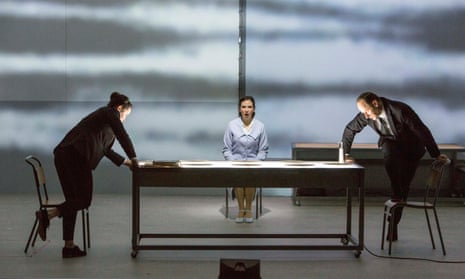A mesh of squares and rectangles, charts, grids and graph paper forms the visual harness in which the central character in Least Like the Other is held immobile. The human instinct to engineer and make straight that which is socially wayward and irregular is explored in sharp focus, its tragic consequences laid bare, in this one-act work performed by Irish National Opera at the Royal Opera’s Linbury theatre. The composer Brian Irvine and co-creator Netia Jones (director, designer and video designer) have sifted the evidence – interviews, newspaper reports, newsreel – and woven an engrossing docu-opera for four performers and small orchestra, part scored, part improvised.
The result is a many-layered meditation on the eldest sister of John F Kennedy, one of America’s brilliant Kennedy dynasty but considered decidedly less gleaming than her eight siblings. After a lobotomy in 1941 at the age of 23, Rosemary – superbly sung by the young Irish soprano Amy Ní Fhearraigh – lived away from public view until her death in 2005. For most patients, a lobotomy dulled the senses into “perpetual marble calm”, as Sylvia Plath described it in The Bell Jar. This short-lived and brutal form of psychosurgery was in its fashionable infancy. The promise of a panacea for all mental ills proved irresistible, not least to Rosemary’s father, Joseph P Kennedy Sr, who secretly arranged the procedure for his sweet, beautiful but unstable daughter.
Premiered at the Galway international arts festival in 2019, Least Like the Other demonstrates the versatility of Irish National Opera, who triumphed with Vivaldi’s Bajazet at the Linbury last year (working with their associates, the Irish Baroque Orchestra – let us hope for a return visit) and whose online project 20 Shots of Opera remains a highlight of that dismal pandemic year, 2020. The company’s founding artistic director and conductor, Fergus Sheil, negotiated Irvine’s kaleidoscopic score with ease: now madcap brassy toccata, now sinewy, strange meanderings, pairs of saxophones and clarinets, as well as turntables, adding expressive colours. The music’s habit of cutting and splicing mirrors the subject matter itself. Irvine, a former associate composer with the Ulster Orchestra, has collaborated with poets, including Seamus Heaney, visual artists and film-makers: he knows how to shape his eclecticism to powerful effect.
The opera ends, after a cataclysm, with a quiet instrumental chorale, watery and fragile (the mood underlined by Jones’s swimming pool video), as if Rosemary’s pummelled mind is in a state of slow deliquescence. Two actors, Ronan Leahy and Stephanie Dufresne, together with Aoife Spillane-Hinks, who provides voiceover narration, completed the excellent cast. The island of Ireland, south and north, from Wexford and Dublin to Belfast and Derry, is proving an exciting crucible for music. NI Opera’s La traviata was a highlight last year. Conor Mitchell’s riotous Abomination: a DUP Opera, premiered by the Belfast Ensemble in 2019, will have its London premiere in May. Book now and keep a watchful eye.
Three sonatas written at the time of the first world war shaped a captivating recital by the violinist Elena Urioste and the pianist-composer Tom Poster on Sunday. The American-British wife-and-husband duo won a following for their 88 consecutive video streams in lockdown (#uripostejukebox). This Wigmore Hall concert was a welcome chance to hear them in an extended programme of French repertoire, not all of it familiar and concluding with bonbons, immaculately played and joyful, by Cécile Chaminade and others.

In addition to Claude Debussy’s late G minor Sonata (1917), ever unpredictable and questing, they played Gabriel Fauré’s Violin Sonata No 2 in E minor, Op 108, a luscious outpouring of lyricism that suited the duo’s untrammelled and virtuosic musicianship. The evening’s discovery was the Sonata in F sharp minor, Op 112 by Mel (Mélanie) Bonis (1858-1937), a classmate of Debussy. This romantic work, in four movements, echoes the grand scale and ambition of the sonata by her teacher, César Franck.
Bonis’s hair-raising story, involving an illegitimate daughter, a hidden lover, five stepchildren – as well as a few of her own, incest, a religious conscience and the struggles of being a female composer, is ripe for Hollywood. Mél has a certain ring about it, a perfect sequel to Tár (about which I will say only that I thought, on several occasions, my watch must have stopped). Cate Blanchett is already in the zone. Sign her up.
Star ratings (out of five)
Least Like the Other ★★★★★
Elena Urioste and Tom Poster ★★★★
